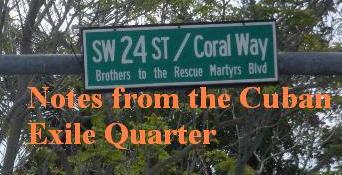 |
| The Payá Family |
by Rosa Maria Payá Acevedo
TO LIVE IN CUBA TODAY
With my mother and my two brothers, Oswaldo, 25, and Reinaldo, 21, we live in one of the oldest, populated and humble neighborhoods of Havana. We are very normal, with the privilege of having an exceptional father that, at age 17, finished his high school at night while during the day he broke stones in the quarries of forced labor, the punishment imposed on him for going to church. We have never complained about lack of material needs because there are some living worse, especially in rural areas. We shop at the same markets stocked as the others. An average salary in Havana fluctuates between 15 and 20 dollars a month, but a bottle of oil costs two. A kilo of detergent, three dollars and a mop, a dollar. In my house we live only on the pension that my mom receives for the death of our father and the help of our relatives living abroad.
My mom is an engineer, and I graduated in Physics. My younger brother is a student. I studied Sciences after discarding Law, because science seemed more difficult to manipulate. Thus, the Lenin quotes also appeared in the prefaces of my books, but I learned the same differential equations that are taught at Berkeley. I don’t have a job, because the government took advantage that I was transferring from the Institute of Astronomy to a research institute at the University of Havana and pressured to refuse me entry. I love science, but also the humanities and in the future, I would like to dedicate time to them. Studying makes me happy. I lament that I could not go to Chile, a diploma in public administration and political theory at Miguel de Cervantes University interests me because it is ambitious. Chileans are a people who I respect and admire and Cubans can learn from their reconciliation process. But I could not travel. Those are the costs of living and struggling in Cuba.
In my family we have a Volkswagen car from 1964 and we consider ourselves very fortunate. A car is a rather prohibitive on the island, except for the hundreds of Fords or Oldsmobiles from the 1950s that are circulating and polluting. I move on bus (micro) or Cuban taxi, the race costs between 5 cents and half dollar. Public transport, although it has improved since my childhood, is bad: at peak times it is difficult to take and bus stop schedules are not met. But the youth, we battle the deficiencies. The Cuban people are, by nature, gregarious and cheerful, and that helps the climate.
Young people love to get together in the evenings to talk, smoke, sing, and laugh or just to be, to spend time. I love going out with my friends, but I have had very little time since my father died. In Havana there are some pubs and clubs, but we hardly frequent them because they are little varied and very expensive. The young cultivate our own way to have fun, a simple way, without money. Each night we gather around the boardwalk (malecón) and on G Street, a major thoroughfare whose central splitter is a large park. There the young gather, there is joy when you share with friends.
Cubans are the model of what the imagination combined with the lack of options can achieve. So we, the young, have taken areas of the city. But we also know that to sit in a café, dress with illusion, or talk in a bar, the opportunities in my country are very few or are beyond our reach. Once we were with my family on vacation to Varadero and stayed at the village church, because we know the priests. My only exceptional trip was in 2008, when I went to Poland invited by a group of young Catholics, I spent three days in Rome and some days in Madrid to see my family.
It is true that education and health in Cuba are public, but would Chilean students change their voting rights, freedom of expression, freedom of enterprise and their right to leave and enter the country freely for free higher education? I think not. In public health there are also no miracles: when a surgeon should go out to operate on bicycle while at the same time building with his own hands a house for his family, and the salary is not enough, the patients end up paying the consequences, no matter the good that doctor may have.
For young Cubans it is very frustrating to live in a place that is offline, as if living at a different time on the planet. There are prohibitions against having internet at home, those who do have received special permission from the government, or they violate the law. Network communication is censored: there are many pages that cannot be accessed and at universities and workplaces internet access is monitored and censored. Because of this the Christian Liberation Movement, of which I am the public face of since my father died, and other opposition organizations promote the Heredia Project today, a project that requires, among other things, the right to free internet access, e mail, telephone, satellite television and cable.





No comments:
Post a Comment